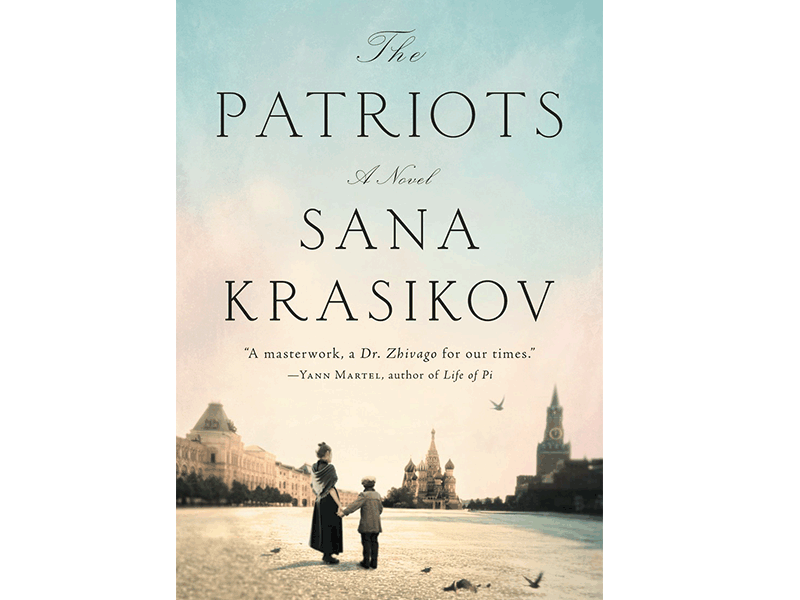Sana Krasikov was barely 10 years old when the Berlin Wall collapsed into a heap of broken brick, cinder block and shards of rusted barbed wire. Although still in her formative years in the Republic of Georgia, Krasikov undoubtedly internalized some of the light cast by the samizdat and other underground publications concerning the repression and suppression that was then the cruel, last-gasp relic of the Soviet Union’s brutal totalitarian oppression.
Krasikov has combined what she likely learned growing up in her home in the former Soviet Union with extensive research to produce a magisterial debut novel of multi-generational historical fiction. The Patriots is superb. It succeeds substantively and stylistically as a work of ragingly compelling literature.
Krasikov begins her story in Brooklyn in the late 1920s, at the start of the Great Depression. Florence Fein, born in 1910, wishes to pursue a life of personal relevance and meaning as an exemplar of fairness and equality. She seeks that life and fulfilment in Russia, where the future according to Florence’s animating values – a world without economic injustice – is unfolding in large, bold strides. Indeed, in what readers eventually discover to be Florence’s keen self-focus, she explains, “Breaking your family’s heart was the price you paid for rescuing your own.”
But, as the novel makes clear with agonizing force throughout its 550 pages, rescuing one’s own heart often inescapably entails shattering the hearts of others. There is no neat, morally uncluttered, pain-free passageway toward a better world, Krasikov seems to be telling us. Moreover, even a rescued heart may not remain so forever. A life lived in pursuit of “the grand idea” may be accompanied by decidedly non-grand daily details, such as those borne by Fein throughout her life in Russia.
READ: ORPHAN’S TALE STRIKES A HORRIFIC CHORD
And so we read: “The diabolical paradox of her life was that her escape from America had been fuelled by an ambition to flee the servitude of domesticity. And yet, at 38, after a day of working as an equal alongside men, her liberation took the form of evenings spent elbowing in lines for food, arguing with her neighbours over every square centimetre of ledge space and scrubbing her child’s linens on an old washboard in the common tub. Come morning, there was more waiting this time outside the common toilet to flush the chamber pot from the night before.”
Krasikov has crafted a deeply affecting, sweeping panorama of Russian (and Soviet) history from the post-revolutionary era to modern times: from the sadistic, paranoid, ruthless rule of Josef Stalin, through World War II, the gulag penal system, the Cold War, the collapse of the Iron Curtain, the Wild West of free-rein, unregulated Russian capitalism and the frequently corrupt industrial-commercial framework created by Vladimir Putin.
The novel interweaves the lives of Fein and her husband, Leon, their son Julian and grandson Lenny. Fein left America for the Soviet Union for idealistic reasons. Julian, born during World War II, leaves the Soviet Union for America in the late 1970s because of the country’s brazen anti-Semitism. Reprising his grandmother’s path, though not her motivation, Lenny leaves America for Russia for materialistic reasons – that is, to make his fortune.
Not surprisingly, relations between the generations are complicated, especially between mother and son, due to the recurring intrusion of the pathologies wrought by their respective wrenching personal experiences. The scars are too many to yield an assured healing of damaged emotions and psyches.
Many of those scars were seared into their souls because of the dark, devastating, labyrinthine world of the gulag. Human life was worth nothing at all there, Krasikov tells us. Dread was ubiquitous. Fear of arrest was constant. Everyone was suspected of being an informant. The constant pressure of living under such suffocating circumstances wounded everyone.
“We can’t live how we’re living, like trapped animals, bound, gagged,” Leon pleads with Fein.
“‘Maybe before the war I could, because I dreamed things would get better. But we can never be free here.’ He turned his head toward the pale floral curtain behind which their son slept. ‘I don’t want him to grow up hearing the word “kike” every day.’”
Alas, for Fein, Leon and their circle of friends who were mostly Jewish foreigners, there was no escaping the steel-gloved grasp of the secret police.
Krasikov is brilliant in her depiction of the insidious wearing down of good, decent people, such as Fein, by the relentless cruelty of Stalin’s gulag enforcers. She makes the point over and over again that the ideology – the dream – that had so inflamed and infused the hearts of the Florence Feins of her day with idealism and a driving sense of possibility, was very remote from the lives they actually lived. The theory of the “better world” ideology intersected infrequently, if at all, with the countless pulleys and toggles of everyday life that should advance society toward a higher well-being.
In truth, utopian ideology has frequently been used as a pretext – as it was by Stalin – for establishing a vast complex of governmental control. It was governance by fear. Civilian acquiescence was obtained through civic terror. The single aim of such governance was to ensure unbroken rule by one person, one family, one clan, one party. Despots and totalitarian thugs have always justified their own hold on power in the name of the people whose lives they rule, and often destroy, with grim indifference.
Krasikov’s writing is captivating: strong, jolting and assertive, or tenderly evocative, empathetic and insightful. She has created a novel of large themes – historic, political and philosophical – that compel us to think clearly, if not always comfortably, about our own notion of true personal and societal freedom. Courage, she tells us, in and through the lives of each of the vibrant characters in The Patriots, is freedom’s indispensable prerequisite. But who among us will find that courage when it is needed?
